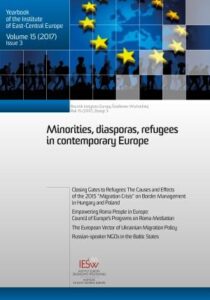ORCID: Simon Goodman: 0000-0001-5007-3740
Pages: 35-53
Edition: Lublin 2017
DOI: --
Citation method: S. Goodman, ‘“Take Back Control of Our Borders”: The Role of Arguments about Controlling Immigration in the Brexit Debate’, Yearbook of the Institute of East-Central Europe, Vol. 15, No. 3, 2017, pp. 35-53.
Abstract:
In the run-up to Brexit, the British referendum on leaving the European Union (EU), immigration was one of the top issues of concern to voters. Discussions about immigration dominated the campaigns, with the “Vote Leave” campaign linking leaving the EU with the opportunity to prevent immigration into the United Kingdom (UK). The focus on this was in part due to the migration and ‘refugee crisis’ in Europe that coincided with the referendum. This paper presents an analysis of how the key players in the Brexit debate focused on immigration. The question is, therefore, how did the participants in the Brexit debate talk about immigration and what did this talk accomplish. Discourse analysis of campaign coverage reveals that: 1. Leave campaigners presented immigration as out of control, including that from within and outside of the EU and those arriving in Europe as refugees; 2. “Remain” campaigners presented Brexit as an ineffective way of controlling migration; and, 3., in limited cases, immigration was presented as beneficial. The conclusion is that the focus on immigration appeared to have been a major factor in the eventual success of the Leave campaign. Although it remains to be seen what impact Brexit will have on immigration, opposition to immigration has become mainstream.
Bibliography:
Britain Stronger in Europe, Will immigration go down if we leave the EU?, http://www.strongerin.co.uk/immigration [2017-08-10].
Edwards, D. and J. Potter, Discursive Psychology, London: Sage, 1992.
Hope, C. and K. McCann, ‘Net migration from Eastern Europe to Britain slows to a trickle after Brexit vote’, The Telegraph, 25 May 2017.
Facebook ‘Vote Leave’, 23 May 2016, https://www.facebook.com/voteleave/photos/a.512228762287386.1073741828.505084413001821/598515206992074/?type=3&theater [2017-09-05].
Gibson, S., ‘Constructions of “the Polish” in northern England: Findings from a qualitative interview study’, Journal of Social & Political Psychology, vol. 3, 2015, pp. 43-62.
Gibson, S., Crossland M. and J. Hamilton, ‘Social citizenship and immigration: Employment, welfare, and effortfulness in online discourse concerning migration to the United Kingdom’, Qualitative Psychology, 2017, DOI:10.1037/qup0000078.
Grice, A., ‘EU referendum: Poll reveals 10-point swing towards Brexit as Leave campaign gains momentum’, The Independent, 10 June 2016.
Kirkwood, S. and S. Goodman, ‘Discursive psychological research on refugees’, in: S. Gibson (ed), Discourse, peace and conflict: Discursive psychology perspectives, in press.
Goodman, S., ‘“It’s not Racist to Impose Limits on Immigration”: Constructing the Boundaries of Racism in the Asylum and Immigration debate’, Critical Approaches to Discourse Analysis across disciplines, vol. 4, no. 1, 2010, pp. 1-17.
Goodman, S. and A. Narang, ‘“Sad day for the UK”: The linking of debates about settling refugee children in the UK with Brexit’, under review.
Goodman, S. and S. Speer, ‘Category use in the construction of asylum seekers’, Critical Discourse Studies, vol. 4, no. 2, 2007, pp. 165-185.
Mason, R. and H. Stewart, ‘Brexit would not mean a big drop in immigration, Hilary Benn says’, The Guardian, 13 June 2016.
Morris N., ‘General Election 2015: Immigration—how the parties are playing the numbers game’, The Independent, 22 April 2015.
Office for national statistics, Population of the UK by Country of Birth and Nationality: 2015, https://www.ons.gov.uk/peoplepopulationandcommunity/populationandmigration/internationalmigration/bulletins/ukpopulationbycountryofbirthandnationality/august2016 [2017-08-10].
Sharman, J. and I. Jones, ‘Hate crimes rise by up to 100 per cent across England and Wales, figures reveal’, The Independent, 15 February 2017.
Smith, M., ‘Pro-Brexit Wetherspoons boss admits he employs 3,500 staff from overseas’, The Mirror, 3 June 2016.
Stone, J., ‘Leaving the EU will not stop immigration to the UK, says leader of campaign to stay in the EU Stuart Rose’, The Independent, 25 January 2016.
Taylor, A., ‘General Election 2015: Immigration—how the parties are playing the numbers game’, The Independent, 22 April 2015.
Taylor, L., ‘UK asylum claims drop despite rising Middle East refugee crisis’, The Independent, 24 February 2017.
The electoral commission, EU Referendum results, https://www.electoralcommission.org.uk/find-information-by-subject/elections-and-referendums/upcoming-elections-and-referendums/eu-referendum/electorate-and-count-information [2017-08-10].
Travis, A., ‘Mass EU migration into Britain is actually good news for UK economy’, The Guardian, 18 February 2016.
Travis, A., ‘Fewer Britons living in EU than previously thought, study finds’, The Guardian, 27 January 2017.
UKIP, UKIP national billboard campaign, http://www.ukip.org/ukip_national_billboard_campaign [2017-09-05].
UNHCR, A million refugees and migrants flee to Europe in 2015, http://www.unhcr.org/567918556.html [2017-08-10].
Wood, V., ‘“Migration is OUT OF CONTROL”: Farage blasts Government’s European Union immigration farce’, The Express, 14 May 2016.
Wood, Z., ‘UK labour shortages reported as EU worker numbers fall’, The Guardian, 13 February, 2017.
Zeffman, H., ‘Leave will leap on the immigration rise, but Brexit would not make much difference’, The New Statesman, 26 May 2016.

PDF: Download